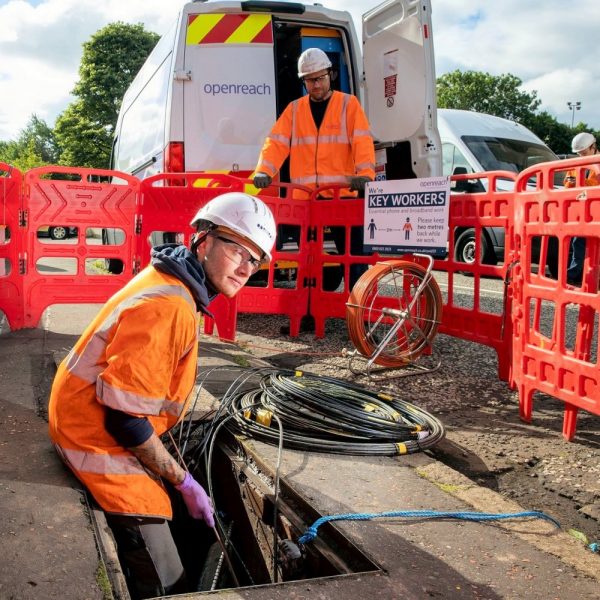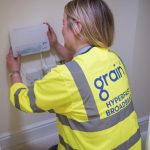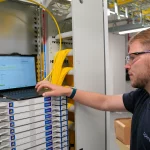Openreach Hire 5,300 Extra UK Fibre Engineers and Go Full EV

Openreach (BT), which plans to invest £12bn to extend their 1Gbps Fibre-to-the-Premises (FTTP) based broadband ISP network to 20 million UK premises by the mid to late 2020s (2025 – 2030), has confirmed that they will create another 5,300 engineering jobs during 2021. Plus they’ll convert their entire fleet to EVs by 2030.
The addition of several thousand new engineers should not come as much of a surprise because Openreach is continuing to ramp-up their FTTP rollout. On top of that they may need more of them in order to help cope with their accelerated transition away from older copper line services (here and here).
The engineering expansion includes more than 2,500 full-time jobs within Openreach’s own service and network build divisions, as well as an estimated 2,800 positions in its UK supply chain, through partners such as Kelly Group, Instalcom, Kier, KN, MJ Quinn, Morrisons, Telent, John Henry Group and NMCN.
Advertisement
The new trainee roles will be filled during 2021 and come with a starting salary of £21,845 and recruits can be earning up to £28,353 following 12 months of specialist training to achieve an NVQ level 2, in one of Openreach’s training centres. The new roles will be located in communities throughout the country.
Just for some context. Openreach already employs more than 34,500 people, including more than 25,000 engineers who build, maintain and connect customers to its nationwide broadband network. Over the last two years alone, Openreach has created more than 6,500 trainee engineering roles to support its build programme.
Openreach CEO, Clive Selley, said:
“As a major employer and infrastructure builder, we believe Openreach can play a leading role in helping the UK to build back better and greener. Our Full Fibre network build is going faster than ever and we’re now looking for thousands more people to build a career with Openreach and help us upgrade broadband connections and continue improving service levels. We’re also investing in our supply chain, which will support the creation of thousands of jobs based all over the UK.
We know the network we’re building can deliver a host of green benefits – from consuming less power to enabling more home working and fewer commuting trips – and we’re going to take that a step further, by committing to build and maintain that network using state of the art electric vehicles across our 27,000-strong fleet. We’ll have completely transitioned to EVs by 2030.”
Rishi Sunak MP, Chancellor of the UK Government, said:
“Throughout this crisis I’ve been clear that our number one economic priority is to protect jobs so I’m delighted to welcome this announcement of 5,000 new skilled roles.
We’re investing billions of pounds across the UK as part of our Plan for Jobs to ensure nobody is left without hope or opportunity.”
On the subject of engineer vans and cars, we note that the BT Group only recently announced that they intended to convert a third of their 27,000 strong fleet of Openreach vehicles to electric by 2025 (here). However, today’s announcement sets an additional target, which will see them aim to convert all of those remaining vehicles to EVs by the end of 2030 (this seems to be aligned with the UK Government’s plan).
The operator has already conducted trials with a number of different EVs, such as various models from Renault (here) and Vauxhall (here), so we can expect to see that expanded. Judging by the wide time-scale they should be able to do all of this through a natural upgrade process, as existing vehicles reach end-of-life.
Advertisement
We should point out that, at present, the EV upgrade plan doesn’t include specialist vehicles and equipment (e.g. hoists/cherry-pickers, ditch witches etc.). One reason for that is the lack of affordable EV alternatives, but this may well change over the next decade.
Mark is a professional technology writer, IT consultant and computer engineer from Dorset (England), he also founded ISPreview in 1999 and enjoys analysing the latest telecoms and broadband developments. Find me on X (Twitter), Mastodon, Facebook, BlueSky, Threads.net and Linkedin.
« Trustwave Find Security Holes in D-Link’s DSL-2888A Router






















































“will create another 5,300 engineers”
Wow, they can actually CREATE engineers now?
The Matrix has you, Neo.
I’d agree with their statement if they are training them with a qualification that leads to use of a title containing the word engineer.
Not entirely sure an NVQ level 2 cuts that, but it *is* a reasonably skilled job, and probably a better option than delivery driver – which could also be going away in the mid-term.
They chose the cloning vat when they play C&C RA2. Hopefully they can clone one to do the job they announced 6 months ago that has no progress on it.
Perhaps an unenlightened question and I’m not trying to start a fight – this is a genuine question: when the fibre rollout is ‘finished’, what happens to those jobs?
Let’s just say hypothetically for example they can employ and train enough people (and obtain enough materials) to connect every property to full fibre in 12 months time – yes I realise some maintenance will be required, new installs for new housing/industrial developments, some people can be retrained, some will go private and work on business networks, some will be ready for retirement… But what of everyone else who has done their job and is no longer needed?
And next question – are we going to need a national 10gb- or 40gb- or 100gb-capable rollout for 2050 (or whenever) – is data usage (or the marketing machine at any rate) going to demand a never-ending requirement faster internet speeds to individuals – how much of it is an uninformed and unnecessary exercise in keeping up with the Jones’, or do you think it will plateau at some point, like CPU clock speeds seem to have done somewhat? Perhaps it will be driven by other aspects such as 8k or 16k TV – I just mean 4k only requires something like 25mbps, so how many simultaneous 4k video calls is one household likely to be having?
I absolutely think the copper network needs replacing nationwide, I’m not a naysayer – I’m just interested in what happens next.
It is an interesting question.
But I think you are posing the wrong question.
The real question is ‘when will society’s demand for instantness plateau’
This is what is driving it.
People don’t want to wait overnight for an Os download or a week for their backup to finish. People expect it all to be instant with immediate gratification.
I certainly would value better upload speeds at home as I’m on GFast.
VM are thinking about 10G – there is no good reason why FTTP can’t be upgraded to 10 -> 100G. Therein you slightly answer your own question as to what the engineers do – upgrade the network.
Sure there will be natural wastage as you point out and there will be teams working on the last 15% for some years to come.
I would agree with A_Builder, natural attrition and voluntary redundancy will help Open Reach once the build is complete. Those technicians can then go on to work with competitors on their builds, so no worries for a good while yet.
As for networks? I used to work for TT and one of the questions I was asked was: how could we use 1Gbps? I am a video specialist and honestly it’s not easy with current technologies. Streaming occupies most of the core network traffic these days but not much of the last mile. There is very little value in uncompressed (1.5-3Gbps for HD) video over moving to something like 45Mbps or 150Mbps encoding.
I have 100Mbps at home, 99% of the time that connection is pulling down less than 5Mbps even while working from home. I would like it to be more symmetrical and have fast uploads but that’s a like, not a need most of the time. Gigabit is nice, but personally, I wouldn’t pay much of a premium for it.
It’s worth adding that building the connectivity isn’t the end of it. Once the connection is made you need to feed it. Expanding the core switching is just a fair investment, but what about the CDNs?
Going 10x or 40x on switching to get a thick backbone is one thing, as there are only a few nodes. But going 10x on a CDN means at least 5x more caching servers. Those servers are very expensive, have you seen the price of 200Gbps nvme cache servers?!
“I just mean 4k only requires something like 25mbps, so how many simultaneous 4k video calls is one household likely to be having?”
Higher speeds have an effect on lowering latency, especially on a shared network.
If you can download your next 10mins of video faster, then you are out of the way for someone else to download their 10mins of their movie. The line is quieter for longer because you were able to get your data quicker.
This is where you’ll see a benefit in video calls having less lag and less buffering, because lower contention.
@Bob H
The other side of the coin is just to get reliable connections to a lot of people stuck on sub 50Mb/s connections.
So you have 100 (symmetric?) which I agree for most families is fine. Most of the problems people are running into with WFH Zoom/Teams calls are on the upstream side so if you are on a marginal FTTC connection, which on a good days gives you 30/7 then you do have real problems when two adults are on work calls and the kids are on Google classroom.
I don’t think the average family needs 1G, yet…..but the point is that you can then order it and it can be provisioned remotely pretty much instantly.
The reality is that most of the Alt Nets do symmetric and so the market will get pushed in that direction. Otherwise OR/VM will be vulnerable to being written out of a large part of the plot in areas where Alt Nets can aggressively market their symmetrical virtues.
before i retired 3 years ago a lot the new starters were on a 2 year contract and other ” new” jobs were re-deployees from other parts like exchange frames people as their work was starting to diminish